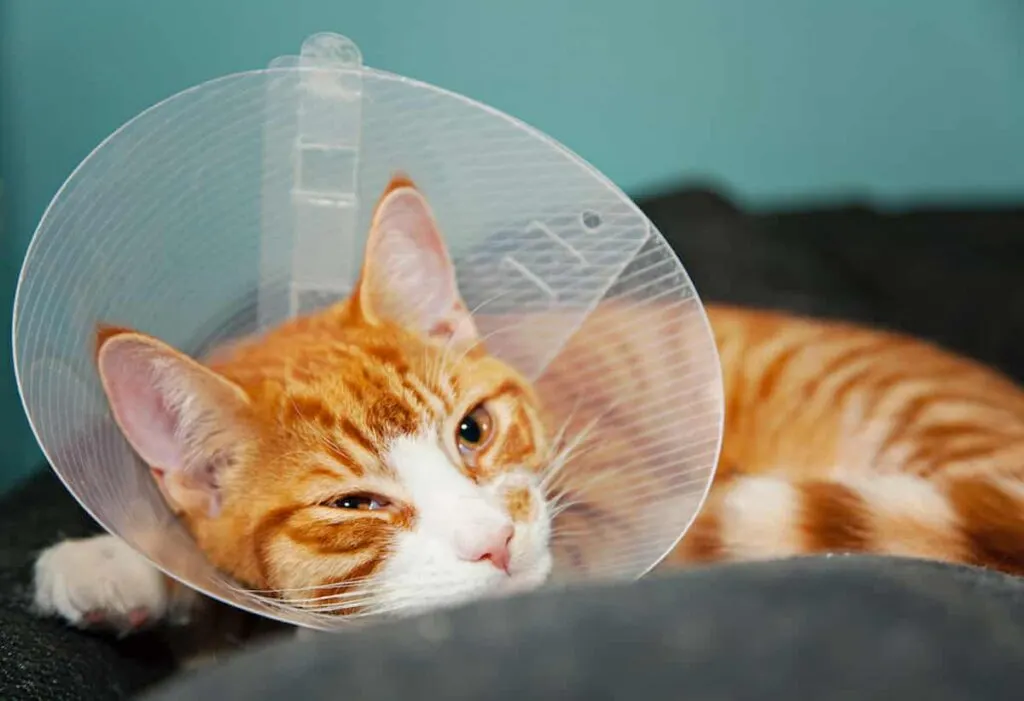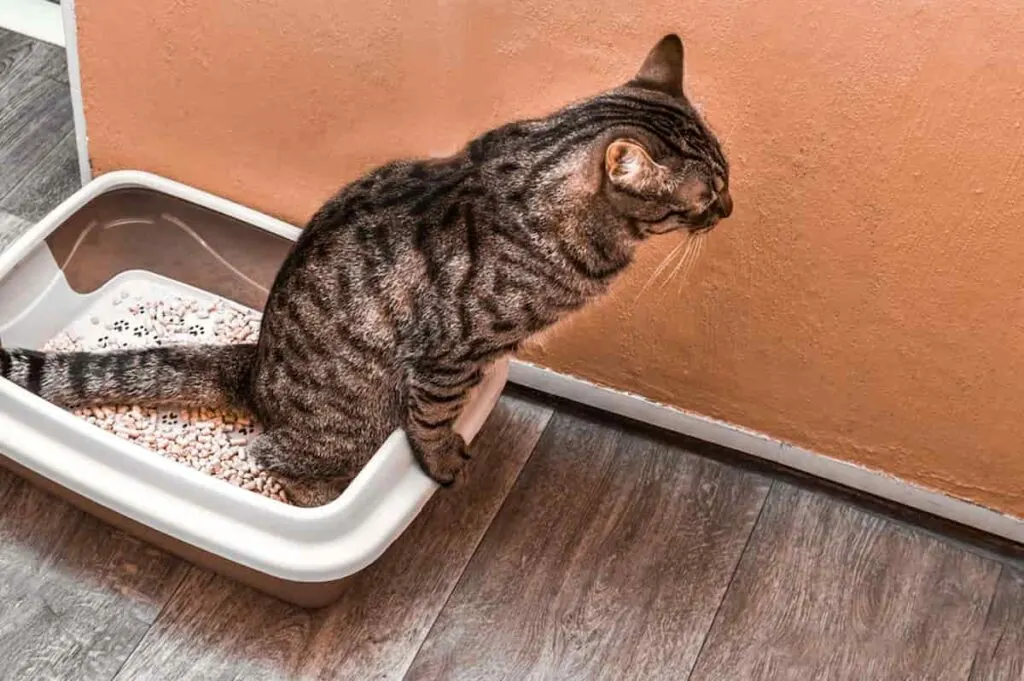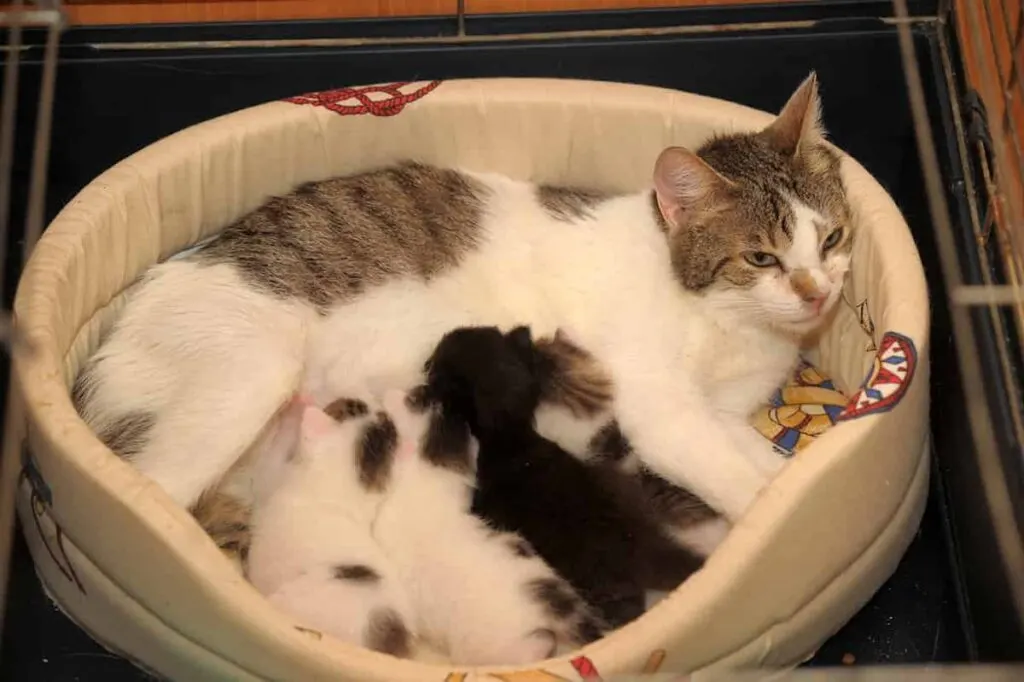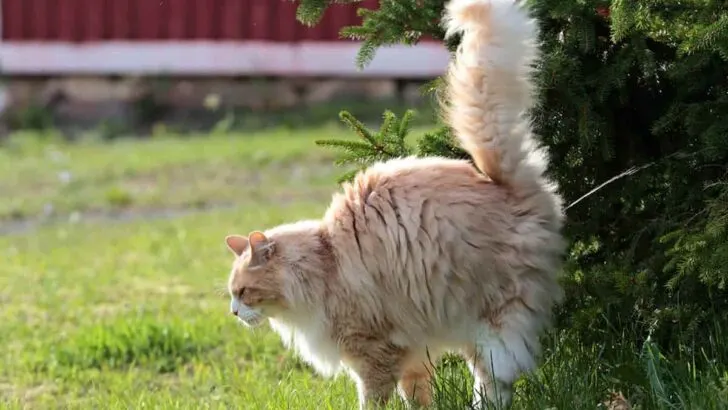Neutering your cat can offer many health benefits and minimize behavioral issues, but many cat owners wonder, how long do cats spray after neutering?
Over 90% of cats typically stop spraying within 6 months after the procedure. While male cats often start spraying between 6 and 12 months of age, neutering them around the time they reach sexual maturity—between 5-6 months—usually prevents this behavior.
Both male and female cats are less likely to spray if they are spayed or neutered and live in a stress-free environment where their social and emotional needs are met.
That said, it’s essential to understand that neutered or spayed cats can still spray, primarily due to medical conditions or stress.

Neutering and Its Effects
Neutering is a vital procedure with short-term and long-term effects on male cats. Without it, your cat will become frustrated and constantly in the heat phase. It’s one of the primary reasons we had our cat neutered.
Benefits of Neutering
One of the main advantages of neutering is that it helps curb undesirable behaviors in male cats, such as spraying. Over 90% of cats stop spraying within 6 months of being neutered. Neutering also reduces the risk of fight wounds, infections, and the transmission of diseases like FIV and FeLV.
That sounds like a good thing, right? But there’s more to it.
Another benefit is that neutering can prevent issues with overpopulation, as neutered cats can’t reproduce. Moreover, neutered cats are generally calmer and less aggressive after the procedure, making them easier to manage and more enjoyable as pets.
When we neutered our cat, we did it early enough so we never had to witness him spraying or getting aggressive. He definitely calmed down within a few months of the procedure though, which made raising him a lot easier for us.

Post-Neutering Recovery
Recovery from simple neutering procedures usually takes 5-7 days, while healing from abdominal surgery typically takes 10-14 days. During this time, monitoring your cat closely and ensuring they are comfortable and healing properly is crucial.
Here are some guidelines for post-neutering aftercare:
- Keep the cat in a quiet and warm environment.
- Prevent your cat from licking or chewing at the surgical site.
- Provide fresh water and a comfortable place to rest.
- Monitor your cat’s appetite – they may not eat as much in the first day or two after surgery.
- Contact your veterinarian if you notice any redness, swelling, or discharge at the surgical site or if your cat seems unwell.
Most cats will try to lick the surgical site, but I remember in our experience, the vet put our cat’s head in a cone to help prevent that. He’s savvy though, and tried to use his legs to work around the cone so he could lick at himself. So, keep a good eye on your cat so that doesn’t happen.
It’s important to remember that even after neutering, some cats may continue to spray, especially if they were neutered later in life or have underlying medical issues or environmental stressors. So, monitoring your cat’s behavior and well-being is essential even after recovery.
How Long Do Cats Spray After Neutering?
When it comes to spraying after neutering, the timeframe can vary depending on a few factors, but let’s dive into what to expect.
It can take at least four weeks for the sperm to leave a cat’s system following neutering. This means that even after the surgery, it might take about a month before you notice a significant change in their spraying behavior.
However, it’s essential to note that the success of neutering on stopping spraying behavior also depends on your cat’s age when they get neutered. If cats are neutered around the time they reach sexual maturity—between the ages of 5-6 months—they will likely not spray.
Unfortunately, if your cat has already developed a habit of spraying, neutering might not immediately end this behavior. In that case, you can take other steps to discourage them from spraying, such as maintaining a clean and stress-free environment for them.
Remember that while neutering dramatically reduces the chances of a cat spraying, there’s no guarantee it will completely eliminate the behavior. Other factors, such as stress or territorial disputes with other cats, can still trigger spraying even after neutering.

Factors Affecting Spraying Behavior
This section will discuss factors influencing a cat’s spraying behavior even after neutering.
Age at Neutering
Usually, if cats are neutered around the time they reach sexual maturity—between the ages of 5-6 months—they are less likely to spray. Cats neutered after one year may continue spraying due to existing testosterone levels and chronic marking behavior.
However, it is important to note that even after neutering, a small percentage of cats may continue spraying regardless of the age at which they were neutered.
In our experience, we got it done around 8 months of age, and he turned out just fine. Spraying was never much of an issue to begin with, so perhaps that was a factor.

Environmental Factors
Environmental factors can also substantially affect a cat’s spraying behavior after neutering. Stressful situations, such as changes in household routines, the addition or loss of a family member or another pet, or conflicts with other cats, can contribute to spraying.
To minimize stress, try to maintain a stable environment, provide safe spaces for your cat, and carefully introduce new changes.
Medical Concerns
Medical conditions can sometimes cause a cat’s continued spraying after neutering. Conditions like urinary tract infections or bladder stones can lead to inappropriate elimination behaviors such as spraying.
If you suspect your cat has a medical issue or you’ve noticed changes in its behavior after neutering, consult your veterinarian to rule out any underlying health concerns.

How to Prevent and Manage Cat Spraying
Preventing and managing spraying can be broken down into three sub-sections: Environmental Modifications, Behavioral Training, and Professional Help. Using these approaches, you can help your cat feel more comfortable in their surroundings and reduce the likelihood of spraying incidents.
Environmental Modifications
First, let’s discuss some environmental changes that can help reduce cat spraying. Ensuring that your cat has sufficient resources like food, water, and litter trays is crucial. Additionally, the placement of these resources can impact your cat’s overall feelings of security, making them feel more relaxed and less likely to spray.
- Keep litter trays clean, and consider having multiple trays in different locations.
- Ensure enough food and water is available for your cat, especially in multi-cat households.
- If you have multiple cats, provide different resources to minimize conflicts that can lead to spraying.
Behavioral Training
Next, behavioral training can significantly reduce a neutered cat’s urge to spray. Be patient and consistent with your efforts, even if it takes some time to see positive results. Here are some ideas to try:
- Positive reinforcement: Reward your cat for using its litter tray or for displaying other desirable behaviors.
- Address any triggers: Identify any specific stressors that might encourage your cat to spray and do your best to eliminate them.
- Maintain a routine: A predictable schedule can give your cat stability and reduce stress.
Professional Help
If you’ve unsuccessfully tried environmental modifications and behavioral training, it might be time to seek professional help. A veterinarian or a certified animal behaviorist can assist you in determining the underlying cause of your cat’s spraying and suggest appropriate treatments.
In some cases, medical issues might contribute to your cat’s spraying behavior, so it’s essential to rule out any underlying health problems. Don’t hesitate to consult a veterinarian if you suspect a health issue or if your cat’s spraying continues despite your efforts.
Remember, preventing and managing cat spraying takes time, patience, and various approaches. Stay positive and committed to helping your cat; you will see progress over time.

My name is James, and welcome to FAQCats!
Along with our team of cat owners, expert pet enthusiasts, and pet professionals, we aim to write engaging helpful, engaging content about cats. At FAQCats we strive to provide content that’s accurate and fun to read. Our team writes about everything related to cats; even the most complex of topics. Through extensive research and caring for our own fur-pals, we’re able to provide something cat owners worldwide will love. Have a look around, and leave us feedback anytime!

